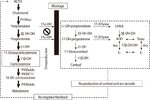If anybody is familar with the cortisol synthesis pathway please let me know. I have not studied it enough to make any connections yet; however, I've come across a possible culprit: 17 alpha-hydroxylase/17,20-lyase deficiency. It could be possible that the HPTA suppression caused by excessive cortisol and its downstream metabolites, which are steroids after all (since CB is steroidal), are far more dangerous and damaging than the direct systemic AA effects caused by low levels of un-metabolized CB.
Edit: After doing a quick search, I've put two and two together, but I still don't have the full picture, I'm sure. Take a look at the attached image.
We know from the Winlevi trials that ~10% of patients acquired HPA axis suppression, which was measure by abnormal ACTH (Adrenocorticotropic hormone), which is secreted by the pituitary gland. ACTH acts as a regulator for hormone production. My proposal is that in the case of the patients with HPA axis suppression, abnormally high levels of ACTH indicate an underlying issue, namely a short-circuiting of the cortisol synthesis pathway, where the 17 alpha-hydroxylase enzyme is underexpressed, severely reducing the normal conversion of pregnenelone and progesterone to cortisol and androgens like testosterone.
According to the pharmacokinetics of clascoterone, it breaks down into Cortexolone 17alpha-propionate, which is the direct precursor to cortisol. When CB rapidly hydrolyzes into Cortexolone 17alpha-propionate, it raises the baseline conversion rate of cortexolone, leading to elevated levels of cortisol, which will shut off the the normal production cortisol. Now, here is my leap of faith. My very, very unscientific intuition is that the body will shut off natural cortisol production by downregulating expression of 17 alpha-hydroxylase. The major downside is that the conversion into sex steroids will also decrease in proportion to the decrease of natural cortisol production, since cortisol and sex steroids both utilize 17 alpha-hydroxylase at some point in the their respective synthesis pathways. Overtime, ACTH will rise significantly because of the lack of negative feedback of sex steroids.
One issue with my theory is that elevated cortisol caused by exogenous CB - > Cortexolone 17alpha-propionate, should act as negative feedback, therefore reducing ACTH and opening up the pathway into sex steroids via upregulation of 17 alpha-hydroxylase. I am unsure about this contradiction. Moreover, I'm unsure how this has an effect on synthesis of testosterone in the testes, as the picture I've described related to adrenal production of sex steroids, which accounts for a significantly smaller % of overall androgen production in the body. My guess then would be GnRH, but according to my labs, FSH and LH were similar to baselines. Please let me know if you see any major errors in my analysis. I will continue studying in the meantime.

